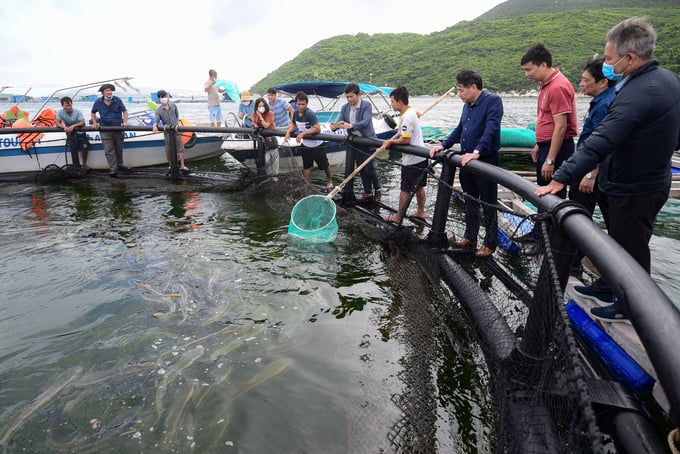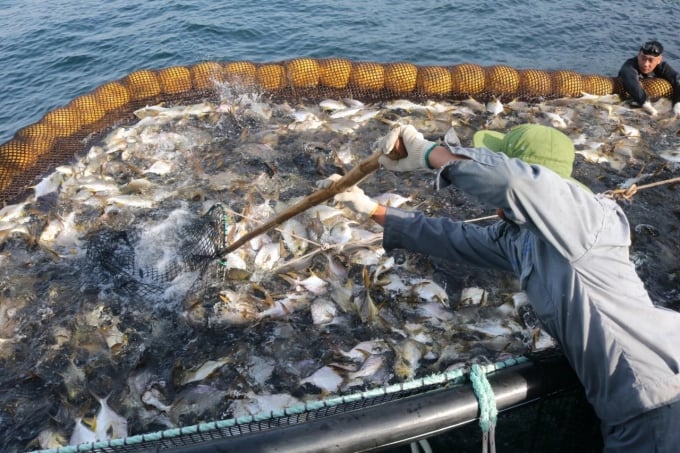June 18, 2025 | 09:59 GMT +7
June 18, 2025 | 09:59 GMT +7
Hotline: 0913.378.918
June 18, 2025 | 09:59 GMT +7
Hotline: 0913.378.918

Aquaculture at sea is a potential new direction in Vietnam. Photo: MP.
Minister of Agriculture and Rural Development Le Minh Hoan has just signed and promulgated Document No. 1775/BNN-TCTS on strengthening aquaculture's direction, management and development at sea.
According to the Ministry of Agriculture and Rural Development, marine aquaculture plays a significant role in economic development to turn our country into a rich marine country.
The policy of marine aquaculture development has been determined by the Party and State in Resolution No. 36-NQ/TW dated October 22, 2018, of the 12th Party Central Committee on the Strategy for sustainable development of Vietnam's marine economy to 2030, with a vision to 2045, Decision No. 339/QD-TTg dated March 11, 2021, of the Prime Minister promulgating the "Strategy for development of Vietnam's fisheries to 2030, with a vision to 2045", Decision No. 985/QD-TTg dated August 16, 2022, of the Prime Minister promulgating the National Program for Aquaculture Development for the period 2021-2030 and Decision No. 1664/QD-TTg dated October 4, 2021, by the Prime Minister approving the Project on development of marine aquaculture to 2030, with a vision to 2045.
The goal is that by 2030, our country's marine aquaculture will reach an output of 1.45 million tons, with an export value of US$ 1.8-2.0 billion. Developing marine aquaculture not only promotes socio-economic development but also contributes to the protection of marine resources for the future, reduces pressure on exploitation, and forms a "Transparency - responsibility - sustainability" fisheries industry, which has fishing activities controlled, managed, according to international recommendations, to build the image of the country responsible for global issues.
To achieve the above goals, the Ministry of Agriculture and Rural Development proposed the Chairman of the People's Committees of the coastal provinces and centrally-run cities to direct the local departments, agencies, sectors and People's Committees at all levels to urgently and seriously implement several key tasks.
Firstly, to grasp the awareness among local leaders and managers about the orientation of marine economic development and the policy of "Reduce exploitation - increase farming" to balance between human needs and keeping marine resources conservation and sustainable development; promote propaganda so that people know, unify awareness and act.
During the implementation of this policy, special attention must be paid to deploying suitable job change models for the workforce in coastal fishing and related services to create livelihoods and ensure social stability.

"Reduce exploitation - increase farming" to balance human needs and preserve marine resources. Photo: MP.
It is necessary to summarize, review and prioritize the occupational groups that must be converted according to regulations, combined with the local marine aquaculture development plan to have solutions to organize and deploy the models of job changes; develop training plans, train skills, and expertise for the workforce that need to change jobs and have appropriate incentive mechanisms and policies for people to participate voluntarily.
Secondly, continue to organize the effective implementation of tasks on marine aquaculture development approved by the Prime Minister in Decision No. 339/QD-TTg dated 11/3/2021; Decision No. 985/QD-TTg dated August 16, 2022, and Decision No. 1664/QD-TTg dated October 4, 2021, thoroughly grasp the thinking that marine aquaculture economic development must integrate multi-values and harmonize with relevant economic sectors such as transport, tourism, wind power, and new rural construction...
Organizing the marine aquaculture ecosystem on the principle of cooperation, association, and people-centeredness, with linkages between leaders and managers at all levels with research units, the business community, organization of people involved in marine farming.
To pay attention to synchronously develop the value chain of marine aquaculture (including seed, cage technology, farming technology, disease control, environment control, nutrition, harvesting, preservation and processing transformation, logistics, application of digital technology, etc.) to create added value in each stage.
The Ministry of Agriculture and Rural Development also suggested that the People's Committees of central-affiliated coastal cities and provinces urgently complete and submit to the Prime Minister for approval the provincial socio-economic development master plan as a basis for making sustainable development plans of marine aquaculture, limiting conflicts of interest in maritime space.
During the planning process, it is essential to note Document No. 183/VPCP-NN dated January 11, 2023, of the Government Office, asking the People's Committees of central provinces and cities to study the opinions of the Ministry of Agriculture and Rural Development in Document No. 7673/BNN-TCTS dated 16/11/2022 on maintaining and stably developing aquaculture in the process of local planning.
Translated by Ha Phuc

(VAN) After 5 years of implementation, the CAI initiative has helped coffee growers change their farming practices, moving toward responsible agriculture that meets global export standards.

(VAN) The primary prerequisite for the comprehensive and robust integration of Vietnam's livestock sector into the global value chain is the establishment of a disease control system.

(VAN) The results of national programs are essential for establishing a contemporary livestock sector that is well-equipped to meet the demands of both domestic and international markets, with robust biosafety standards.

(VAN) The UNESCO Global Geopark revalidation of Non nuoc Cao Bang and the transition to a two-tier administrative model are presently undergoing a pivotal moment in Cao Bang, the northernmost province of Vietnam.
/2025/06/13/5330-2-004539_953.jpg)
(VAN) Changing policy mindset and removing investment barriers are urgent requirements to open up new development space for enterprises in the agricultural sector.

(VAN) The areas include the restoration of five million hectares of marine ecosystems.

(VAN) Dr. Le Van Nguyen, Director of the Institute of E-Commerce Management (ECM), emphasizes the potential for green development through the cultivation of fruit trees, particularly in provinces such as Son La.